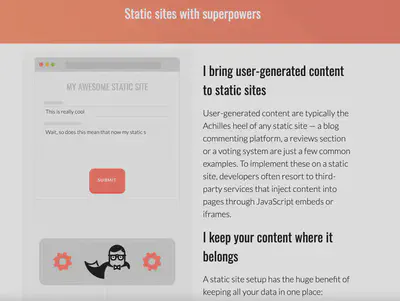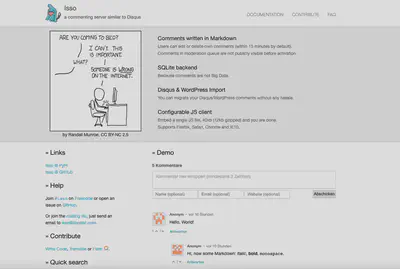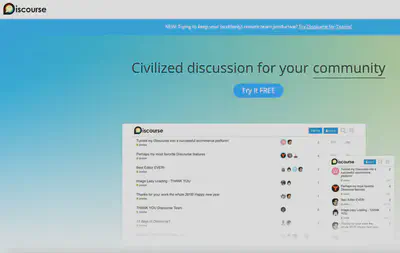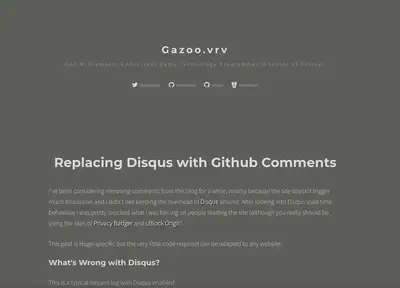Alternatives for Disqus?
Disqus is a top-rated service for hosting and managing comments. But it has as an external service several disadvantages which opposed the philosophy of static websites diametrically. I discuss some alternatives for integrating discussion fora with static websites.
Disqus has a long list of drawbacks
In one of my tutorials I have explained how to integrate Disqus into your static website. But in this article, I recommend looking for alternative comment services. Why this different standpoint? In the meanwhile, I read several articles questioning Disqus. Here is a list of critiques I found on the web (without ranking):
- Disqus is slow and has a bad (re-)loading behavior.
- Disqus is tracking many different things for different customers, some of them hidden and unknown.
- Disqus does not allow
Markdown. - Disqus does not allow anonymous content (IP address, email, and name are recorded).
- Disqus is hosted in the USA, which is considered to have less strict privacy laws than Europe.
- Disqus is not open source.
- Disqus does not allow that users can use free licenses for their comments. It is not clear who has ownership of the comments.
- Disqus is one central authority collecting all comments of your website visitors and users on their servers.

Especially the first and last bullet points defeat the advantages of a static website: Speed and all content always at your disposal. On a static website, data are just plain text files, saved locally on your hard disk. Therefore you can static sites transfer easily: Compress all your data in one zip file and unzip it where ever you want it. With Disqus, these advantages are not valid anymore because your blog text and its comments are hosted separately on different servers.
What are alternatives for Disqus?
Summarizing the disadvantages, I mentioned above I am looking for a system which is
- free
- open source
- and does not host the user-generated comments centrally
The Hugo page on comments lists six available alternatives for comment on static websites1. On AlternativeTo you will find 16 systems2.
Cursory review on some services
Staticman

Staticman is open source and transforms user-generated content into data files to merge in your GitHub repository, along with the rest of your content. This approach seems promising for me, but until now, I couldn’t manage to install it. I have reported my problem, and I am currently waiting for help. As soon as I know how to fix it, I will review the system here on these pages.3
hyothes.is

hypothes.is wants to provide “a conversation layer over the entire web that works everywhere, without needing implementation by any underlying site”. As far as I understand, for this approach, the data has to be stored centrally. So this software again is not an alternative to Disqus. This remark is not a critique of hypothes.is because it belongs to another category of software services. It has a new approach worth reviewing later in more detail.
IntenseDebate

IntenseDebate is a feature-rich comment system for many blogging resp. CMS platforms. IntenseDebate is developed by the people who are behind many other well-known software services (e.g., WordPress.com, WooCommerce, Jetpack, Simplenote, VaultPress, Akismet, Gravatar, to name a few). It seems a bit odd that I could not find newer information on their blog than January 20144. It is free but not open source, but it hosts the content centrally in the US. IntenseDebate is, therefore, no candidate for replacing Disqus.
Graphcomment

Graphcomment is a beautifully designed commenting service with a (limited) free plan. But it is disqualified under my criteria as the code is not open source and it hosts the comments centrally too.
MUUT

MUUT does not allow pre-moderation, e.g. every comment is online immediately. This is an interesting approach, but it is no alternative to Disqus: There is no free plan, and all rights of the user-generated content belong to MUUT!
ISSO

ISSO is a lightweight commenting service, programmed in Python, which allows anonymous comments. It is free, open-source, and installed locally. So it does qualify! But the installation procedure seems complex as there is no GUI, and one has to use the terminal for the installation. Furthermore, it seems to me that not all operating systems are covered. But I should give it a try anyway and review it.
Discourse

Discourse is a feature-rich open-source environment, supports Markdown and allows anonymous posting. As a hosting service, it has no free plan and costs a minimum of US$ 100 / month (with 80% 85% discount for educational resp. 50% for non-profit institutions.). But you can install Discourse yourself without cost on your server. Alternatively, you can pay a one-time fee of US5 With the possibility to install it on your server, Discourse is another candidate to try out.
Using GitHub ()

Using GitHub: Another website is also recommending to use GitHub for comments. I have no clear idea how these proposed code lines will work in practice, but if it works, then it will certainly qualify: Open source, free, supporting Markdown and hosted by the website owner.6
Summary
I reviewed superficially different commenting systems. I was looking for a free, open source system, allowing anonymous content, Markdown and hosted by the website owner. Four services seem to fulfill my criteria: Staticman, ISSO, Discourse and a code proposal by Don Williamson. hypothes.is is an exciting project, but not a commenting system. It belongs, therefore, to a different category of software (annotation systems).
A competent review of these four systems requires a test installation, which I plan to do in the next few weeks.7
Update 2021-05-18: There are now ten services listed. ↩︎
Update 2021-05-18: There are 29 services listed, but not all are open source, and some have already discontinued their service. ↩︎
Update 2021-05-18: Even with some help by the developer I couldn’t manage to integrate it. Seems that my knowledge four years ago wasn’t enough. ↩︎
Update: 2021-05-18: Their blog is not updated anymore, but the main website has recent information, as the footer with copyright 2021 demonstrates. ↩︎
Update 2021-05-18: I adapted the changes of plans. ↩︎
Update: 2021-05-18: Now - four years later - I understand this approach perfectly. There are, in the meanwhile, already a bunch of different services using GitHub. In the new version of this blog, I am using utteranc.es a lightweight comments widget built on GitHub issues. ↩︎
Update 2021-05-18: I have never done these test installations. But at least I have revised this old article. I am still planning to look into details at least of some of these commenting systems. I am using now utteranc.es, and the Academic theme of this blog provides commento, another alternative to Disqus. ↩︎
